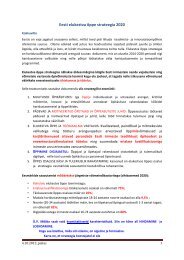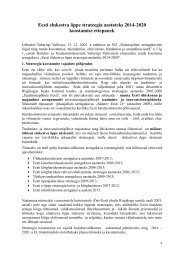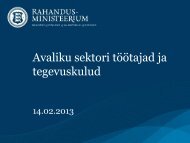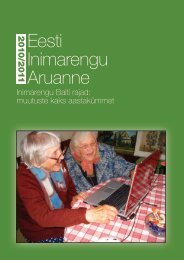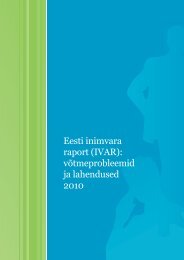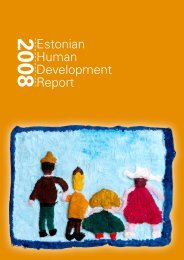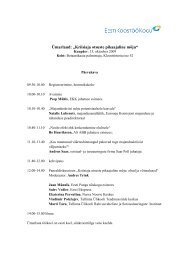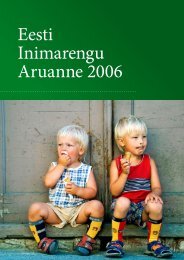DEVELOPMENT
The pdf-version - Eesti Koostöö Kogu
The pdf-version - Eesti Koostöö Kogu
Create successful ePaper yourself
Turn your PDF publications into a flip-book with our unique Google optimized e-Paper software.
Figure 2.8.5<br />
Changes related to trust in political parties in Estonia and the reference countries, from 2006 to 2012.<br />
Estonia<br />
Czech Republic<br />
Slovakia<br />
Hungary<br />
Slovenia<br />
Finland<br />
Denmark<br />
Netherlands<br />
Greece<br />
75<br />
70<br />
65<br />
60<br />
55<br />
50<br />
45<br />
40<br />
35<br />
30<br />
25<br />
20<br />
75<br />
70<br />
65<br />
60<br />
55<br />
50<br />
45<br />
40<br />
35<br />
30<br />
25<br />
20<br />
Trust, percentage<br />
15<br />
10<br />
5<br />
0<br />
15<br />
10<br />
5<br />
0<br />
2006<br />
2007<br />
2009<br />
2010<br />
2011<br />
2012<br />
2006<br />
2007<br />
2009<br />
2010<br />
2011<br />
2012<br />
2006<br />
2007<br />
2009<br />
2010<br />
2011<br />
2012<br />
2006<br />
2007<br />
2009<br />
2010<br />
2011<br />
2012<br />
2006<br />
2007<br />
2009<br />
2010<br />
2011<br />
2012<br />
2006<br />
2007<br />
2009<br />
2010<br />
2011<br />
2012<br />
2006<br />
2007<br />
2009<br />
2010<br />
2011<br />
2012<br />
2006<br />
2007<br />
2009<br />
2010<br />
2011<br />
2012<br />
2006<br />
2007<br />
2009<br />
2010<br />
2011<br />
2012<br />
Source: Eurobarometer<br />
the citizenry in Lithuania, 73% in Slovenia, 70 % in the<br />
Czech Republic, Slovakia, and Hungary, 60% in Estonia<br />
and 55% in Latvia are not satisfied (Figure 2.8.6). Especially<br />
noteworthy is the relatively positive assessment of<br />
the functioning of democracy in Latvia at the end of<br />
2012, when, only a year ago, the majority of the people<br />
were deeply pessimistic when assessing the democratic<br />
development in their state, and its ability to cope with<br />
problems (see Lauristin, Vihalemm 2011). Despite their<br />
government’s drastic cutback policy, the belief of the citizenry<br />
in Latvia and Estonia has proven to be stronger<br />
during the crisis period than it has been in the Czech<br />
Republic and Slovenia, which have set examples for us<br />
in the democracy ratings. It can only be said that quite a<br />
large role is played therein by the freedom of the media,<br />
which allows for an honest and wide-ranging dissection<br />
of the scandals that inflame the public, and of the critical<br />
problems in society, before they develop into waves<br />
of mass protest, as we have seen in Bulgaria, Hungary<br />
and also Greece.<br />
2.8.3<br />
Assessments of the state’s path of<br />
development<br />
In Europe, there are few states, where, despite the crisis,<br />
the majority of the population is convinced that things<br />
are moving in the right direction in their country. When<br />
asked for an assessment of the current path of the state’s<br />
development, most of the opinions are critical. Only in<br />
Denmark and Austria, are there slightly fewer doubters<br />
than there are people who continue to believe that the<br />
country had chosen the correct path of development<br />
(Figure 2.8.7). The greatest doubts about the direction<br />
Figure 2.8.6<br />
Satisfaction with the functioning of democracy in Estonia<br />
and the reference countries, 2012<br />
Satisfied<br />
Denmark<br />
Finland<br />
Netherlands<br />
Austria<br />
Ireland<br />
Poland<br />
Latvia<br />
Estonia<br />
Czech Republic<br />
Slovakia<br />
Hungary<br />
Slovenia<br />
Lithuania<br />
Not satisfied<br />
Percentage 0 10 20 30 40 50 60 70 80 90<br />
Percentage 0 10 20 30 40 50 60 70 80 90<br />
Source: Eurobarometer 78, autumn 2012<br />
98<br />
Estonian Human Development Report 2012/2013



